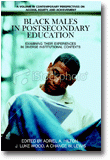
Black Males in Postsecondary Education
Examining their Experiences in Diverse Institutional Contexts
Edited by:
Adriel A. Hilton, Upper Iowa University
J. Luke Wood, Sacramento State University
Chance W. Lewis, University of North Carolina at Charlotte
A volume in the series: Contemporary Perspectives on Access, Equity, and Achievement. Editor(s): Chance W. Lewis, University of North Carolina at Charlotte.
Published 2012
Black Males in Postsecondary Institutions: Examining their Experiences in Diverse Institutional Contexts offers a comprehensive examination of the experiences of Black males in our nation’s higher education institutions. In recognizing the role of institutions in fostering distinctive educational experiences, this volume systematically explores the status, academic achievement, and educational realities of Black men within numerous institutional types (i.e., community colleges, For-profit colleges, Liberal arts colleges, historically Black colleges and universities, ivy league institutions, religious-affiliated institutions, private institutions, Hispanic-serving institutions, research intensive institutions, and predominately White institutions). In line with a core commitment towards transformative change, chapter authors also provide recommendations for future research, policy, and practice aimed at fostering enhanced personal, academic, and career outcomes for Black men in college.
CONTENTS
Foreword, Fred A. Bonner, II. Black Males in Postsecondary Settings: A Rare Examination Across Institutional Contexts, Chance W. Lewis. Community Colleges—A Metasynthesis of Literature on Black Males: An Overview of 40 Years of Policy Recommendations, J. Luke Wood and Adriel A. Hilton. Examining the Phenomenon of For-Profit Colleges and Universities for Minority Students: Implications for Black Males, Tiffany Patrice Fountaine. Untold Stories: An Examination of Selected Experiences of Black Male Graduate Students at an Ivy League Institution, Jonathan Berhanu and Jerlando F. L. Jackson. The Impact of Historically Black Colleges and Universities on African American Men, Marybeth Gasman, Valerie Lundy-Wagner, and Felecia Commodore. Historical Legacy, Ongoing Reality: African American Men at Predominantly White Institutions of Higher Education, Christopher B. Newman, Kenechukwu (K.C.) Mmeje, and Walter R. Allen. Black Men at Religiously Affiliated Colleges and Universities: An Exploratory Glance, Terrell L. Strayhorn, Derrick Tillman-Kelly, Todd Suddeth, and Michael Steven Williams. People, Places, and Things: Examining the Impact of Institutional Characteristics on the Experiences of Black Males at a Research Intensive Institution, Natasha M. Billie and Joelle Davis Carter. Black Males at Not-for-Profit Private Colleges and Universities, Bryant T. Marks, Sylvia Carey-Butler, and Karlton Mitchell. Bridging a Black-Brown Divide? Black Male Students at a Hispanic-Serving Institution, Richard Reddick, Julian Vasquez Heilig, and Patrick Valdez. Black Males Across Institutional Types: Recurrent Recommendations for Research, Policy, and Practice, J. Luke Wood, Adriel A. Hilton, and Chance W. Lewis. Epilogue: A Closing Perspective of the Edited Volume, James L. Moore, III. About the Editors. About the Authors.
-
Paperback978-1-61735-932-3
Web price: $45.04 (Reg. 52.99)
-
Hardcover978-1-61735-933-0
Web price: $80.74 (Reg. 94.99)
- eBook978-1-61735-934-7

-
 Advancing Inclusive Excellence in Higher Education
Practical Approaches to Promoting Diversity, Equity, Inclusion, and Belonging
Advancing Inclusive Excellence in Higher Education
Practical Approaches to Promoting Diversity, Equity, Inclusion, and Belonging
-
 Developing Culturally Responsive Learning Environments in Postsecondary Education
Developing Culturally Responsive Learning Environments in Postsecondary Education
-
 Economic, Political and Legal Solutions to Critical Issues in Urban Education and Implications for Teacher Preparation
Economic, Political and Legal Solutions to Critical Issues in Urban Education and Implications for Teacher Preparation
-
 Imagining the Future
Historically Black Colleges and Universities - A Matter of Survival
Imagining the Future
Historically Black Colleges and Universities - A Matter of Survival
-
 Post-Secondary Planning for All
Approaches to College and Career Readiness Counseling for Special Populations
Post-Secondary Planning for All
Approaches to College and Career Readiness Counseling for Special Populations
-
 Preparing to Lead
Narratives of Aspiring School Leaders in a "Post"-COVID World
Preparing to Lead
Narratives of Aspiring School Leaders in a "Post"-COVID World
-
 Unveiling the Cloak of Invisibility
Why Black Males are Absent in STEM Disciplines
Unveiling the Cloak of Invisibility
Why Black Males are Absent in STEM Disciplines

